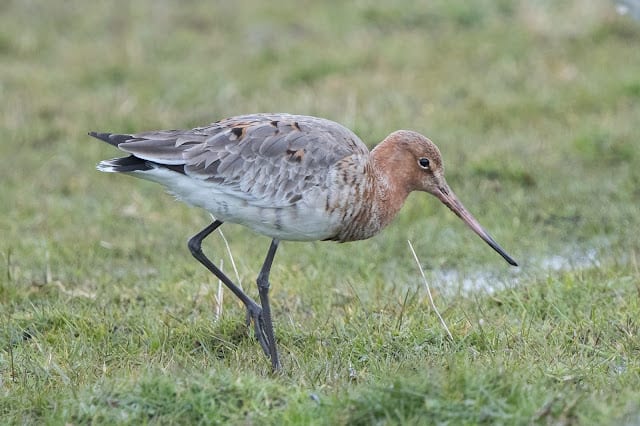I visited Pennington Marsh on 5th and 9th March and on both days saw much the same. Its a pretty static time of year with winter birds steadily but barely noticeably declining and very few migrants appearing. The Lapwing are now in regular display and are busy making nesting scrapes on the marsh while Black-tailed Godwit are coming into plumage and are at varying stages of turning rusty.
Up to eight Ruff were present on the marshes off Lower Pennington Lane and there remain good numbers of Wigeon, Pintail, Teal and Brent Goose as well as the usual waders. There were around 400 Golden Plover on Pennington Marsh on both days, an increase in previous numbers perhaps as a result of the recent cold weather movement.
On 5th I counted 34 Bar-tailed Godwit off Butts Lagoon, a higher number than usual, all were still in winter plumage. On 5th a single Spoonbill flew high to the east.
Black-tailed Godwit with summer plumage beginning to appear on head, neck and scapulars – Pennington Marsh
Black-tailed Godwit with summer plumage beginning to appear on head, neck, wing coverts, tertials and scapulars – Pennington Marsh
Black-tailed Godwit with summer plumage beginning to appear on tertials – Pennington Marsh
Black-tailed Godwit with summer plumage beginning to appear on head, neck and scapulars – Pennington Marsh
Black-tailed Godwit with very little sign of moult to summer plumage – Pennington Marsh
Ruff – Pennington Marsh
Golden Plover – Pennington Marsh
Rock Pipit – Pennington Marsh
The Mute Swan were very feisty at the marsh today with marsh territorial aggression – Pennington Marsh
Sound recording of displaying Lapwing – Pennington Marsh
Sound recording of flight calls of Oystercatcher – Pennington Marsh
Sound recording of displaying Shoveler (eight males and three females) plus sound of the birds taking flight – Pennington Marsh
Sound recording of singing Siskin – Romsey
Sound recording of alarm calling Blue Tit (following pass by Sparrowhawk) followed by song – Romsey
Simon Colenutt
I began birdwatching at the age of nine when living on the Isle of Wight. After obtaining a copy of the Isle of Wight Bird Report from 1976 I realised that Manx Shearwater, Arctic Skua, Pomarine Skua and Black Tern were regularly seen at St.Catherine's Point, only five miles from my home village of Chale Green. To a nine year old these birds were near mythical and so I just had to go and try to see them. Little did I know that these birds were seasonal and after a long winter of seeing nothing I eventually started to bump into other birdwatchers as March drew to a close. It was then that Dave Hunnybun, Dave Wooldridge, Paul Castle, Peter Gandy and Audrey Wilkinson introduced me to the art of seawatching and the joys of bird migration, I have not looked back since.











Leave a Reply